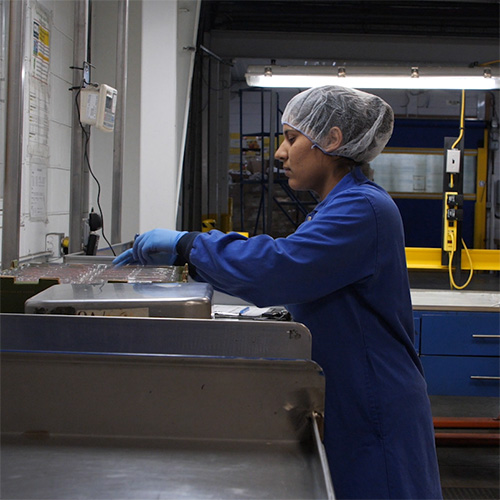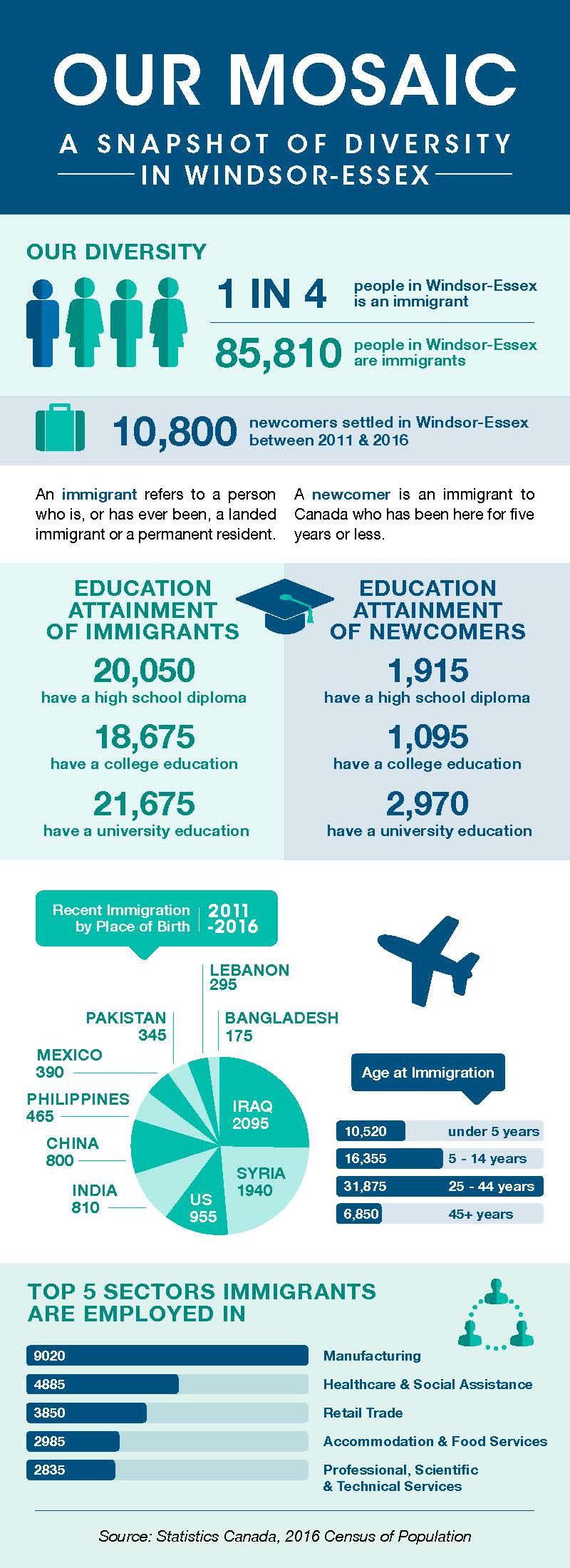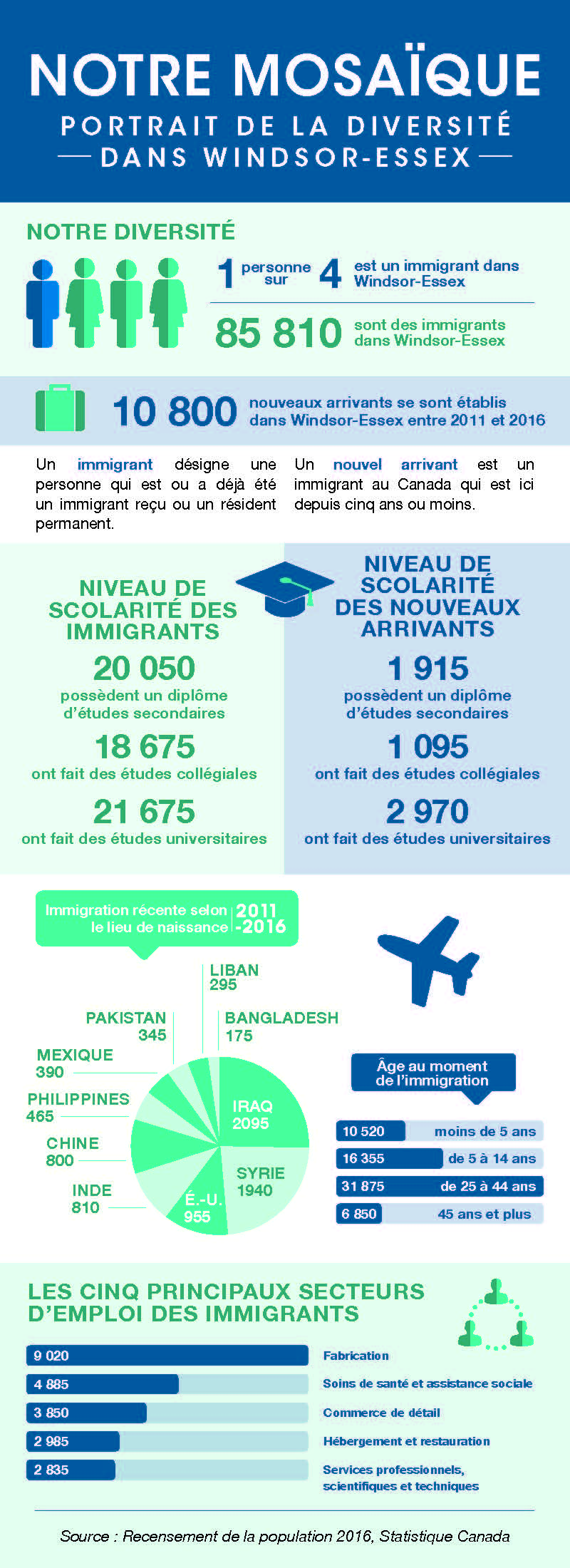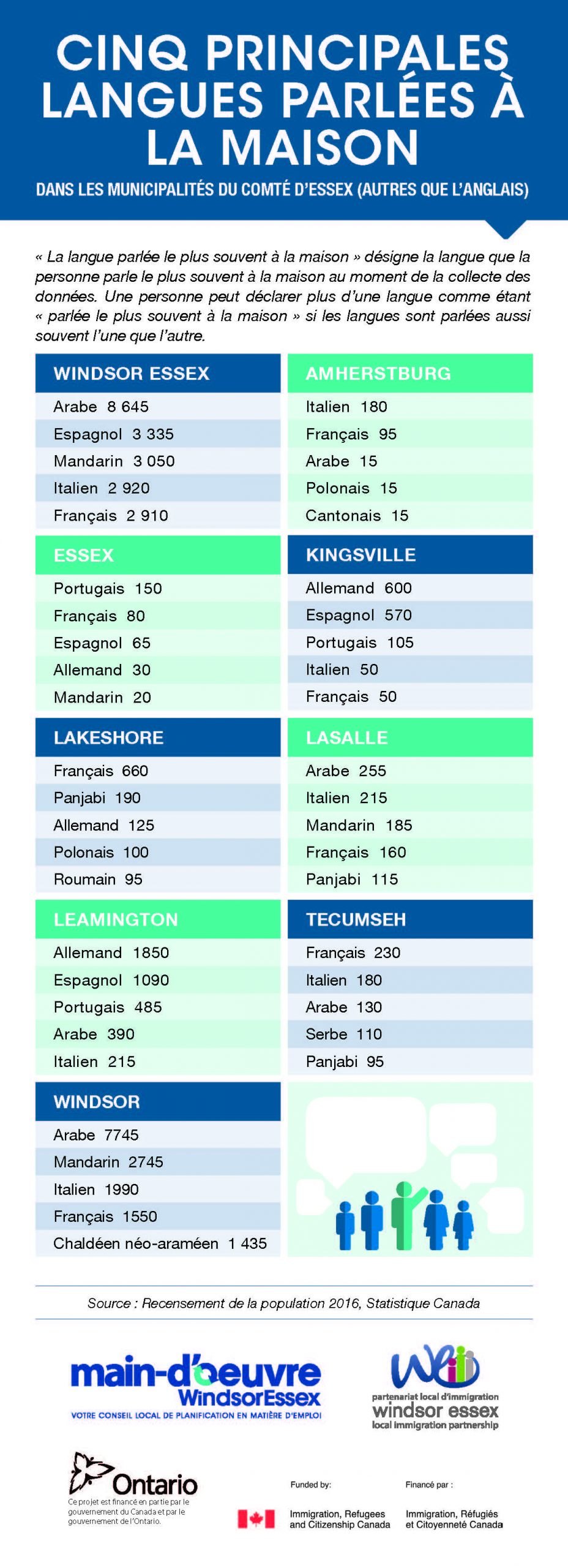Move
This section provides resources for moving and settling in Windsor-Essex.
Applying to Come Here
Applying to Come Here

Immigration, Refugees and Citizenship Canada (IRCC) (en français) decides who can enter our country.
How can I apply to come to Canada?
You may choose to come to Canada as a permanent resident or as a visitor, student or temporary foreign worker.
There are many ways to come to Canada (en français) but it is important to find the one that is right for you (en français).
You will need to find out whether you have to apply before coming to Canada or after you have arrived. These applications usually have a fee and are evaluated on specific regulations. Immigration, Refugees and Citizenship Canada’s website has a list of where you need to send your application (en français).
Comment puis-je faire une demande d’immigration au Canada?
Vous pouvez choisir de venir au Canada en tant que résident permanent ou en tant que visiteur, étudiant étranger ou travailleur étranger temporaire.
Il y a plusieurs manières de venir au Canada (en anglais) mais c’est important de trouver celle qui correspond à votre éligibilité (en anglais).
Vous avez besoin de déterminer s’il vous faut faire demande avant ou après arriver au Canada. Les frais et les évaluations de ces demandes sont basés sur des régulations spécéfiques. Immigration, Réfugiés et Citoyenneté Canada (IRCC) vous informera ou envoyer votre demande (en anglais).
Planning Your Arrival
Planning Your Arrival
There are many different ways that you can travel to our community, so you will need to pick the one that works out best for you and your family. Depending on where you are coming from, you may need to think about the following ways of travelling:
Flying:
- Detroit Metropolitan Airport (in the United States)
- Toronto Pearson International Airport
- Windsor International Airport
Driving:
- Taking a bus
- Taking a train
Multicultural Communities
Regulated Professions & Apprenticeships
Regulated Professions & Apprenticeships

Regulated Professions
In Ontario there are certain professions that are regulated.
To work in a regulated profession, you must be registered by the appropriate regulatory body. You may be able to work in a related field without a licence, but you should first check with the regulatory body to understand what restrictions exist.
It is illegal to use the job title restricted to regulated professions without a licence or certificate from the appropriate regulatory body.
Many professions in Ontario are not regulated by law, but do have voluntary professional bodies. Some of these organizations may offer certification courses and registration, which can help you find work.
You can look at a list of regulated professions online (en Français) [broken link on current site].
(Source: Ontario Immigration)
Some websites that may be helpful to you:
- Global Experience Ontario (GEO) (en Français) [broken links on current site] helps internationally trained and educated individuals in regulated non-health professions and the skilled trades find out how to qualify for professional practice in Ontario. GEO offers free services by phone and email, as well as weekly profession-specific webinars.
- HealthForceOntario (en Français) offers a number of services to health professionals, including a recruitment centre and jobs listing service.
Apprenticeships
An apprentice (en Françis) is someone who learns a skilled trade on the job, under the direction of more experienced workers.
An apprentice is similar to an intern or an understudy. Examples of jobs in the trades include welders, roofers, hairstylists, early childhood educators, bakers and electricians.
Apprentices complete classroom instruction as a part of their training.
Apprentices usually practice 90% hands on and 10% theory. For some trades you need to take an exam after your training.
After you finish all parts of your training, you will be need to be certified to become what is called a “skilled worker” or a “journeyperson.”
There are two categories of trades: regulated or non-regulated. Regulated trades require certification, but non-regulated trades do not.
There are many financial incentives and grants (money) available to help you as you go through your apprenticeship.
Red Seal Trades (en Français) are trades that allow you to work in other provinces and territories.
If you want to be an apprentice you need an employer who will hire and train you. Employment Ontario / Emploi Ontario and the Ontario Job Bank / Guichet emplois can help you find an employer. Apprentices must be members of the Ontario College of Trades.
There are many different pathways for apprenticeship. If you have a child in high school, then they may have the option of starting their training while still in school. This program is called the Ontario Youth Apprenticeship Program or the Programme d’apprentissage pour les jeunes de l’Ontario .
For apprenticeships, some trades are called “compulsory trades.” This means that you have to be certified or be a registered apprentice. Other trades are “voluntary trades.” This means you do not have to have certification to work in voluntary trades.
Windsor Essex Local Immigration Partnership
Windsor Essex Local Immigration Partnership
The goal of the Windsor Essex Local Immigration Partnership (WE LIP) is to create a community where newcomers and citizens can have a higher quality of life and reach their full potential. They seek to accomplish this through communication- which contributes to their mutual goal — that every new member of our community feels like they truly belong and can contribute to Windsor-Essex County.
The WE LIP members often share information, take part in events and plan events, and develop plans to help make Windsor-Essex County a welcoming community.
The WE LIP partners with different sectors such as health care, education, housing, children’s services, developmental disability services, and police to discuss the needs of immigrants and how we can make sure that immigrants have access to the services they need.
The WE LIP also:
- Celebrates the local success stories of immigrants
- Shows employers how diversity can enrich their workplace
- Promotes collaboration between organizations to better serve immigrants
Recent Success Stories
Every month, WE LIP launches a success story to highlight the successes as we work to make Windsor-Essex a more welcoming community. To see new and previous success stories, see below!
Settlement Services
Settlement Services
In Canada, settlement agencies have services for newcomers. Agencies offer services that are often free and always confidential, meaning that your information is not told to anyone else. These services may include:
- Language Instruction for Newcomers to Canada (LINC) and Cours en langue pour immigrants au Canada (CLIC)
- Interpretation and translation of documents
- Help filling out forms
- Help in finding a job or getting employment training
- Information on other community services, schools and health care

The WE Value Settlement Assessment provides Permanent Residents and Convention Refugees in Windsor and Essex County with the connections to opportunities, supports and services based on their strengths, skills and needs.
Book a WE Value Settlement Assessment
Newcomer Settlement Agencies in Windsor-Essex:
English Settlement
- The Multicultural Council of Windsor and Essex County
- New Canadians’ Centre of Excellence Inc.
- South Essex Community Council
- Unemployed Help Centre of Windsor Inc.
- The Windsor Women Working With Immigrant Women
- Women’s Enterprise Skills Training of Windsor Inc.
- YMCA of Southwestern Ontario
French Settlement
Online Resources
- 211.ca has a search section for newcomers so that you can browse newcomer services in our area.
Community Support Services
Many of our settlement agencies have other supports and programs to help you as you adjust. Settlement agencies will have information on the specific types of supports that they have available for you. Examples of different types of supports that you may see in our community are:
- Food Banks
- Clothing Programs
- Home Heating Assistance Programs
- Nurse Practitioner Clinics
Applying for Important Documents
Applying for Important Documents
Once you arrive in Canada, there are some documents that you will need to apply for.
How to Open a Bank Account
If you are hoping to open a bank account or change financial institutions, you will need to go to the bank in person and show proper identification.
The Government of Canada (en français) has information that explains your rights and responsibilities to open a bank account or change financial institutions in Canada .
Driver’s License
You have to be at least 16 years old and have a valid Ontario driver’s license to drive in Ontario.
If you have a license from another province or country, you must apply for an Ontario driver’s license within 60 days of arrival. To learn more about transfering your license to Ontario, visit DriveTest.ca (en français).
Permanent Resident Card
A Permanent Resident Card is proof that you are approved to live in Canada and allows you to leave and re-enter the country.
Visit Immigration, Immigration, Refugees and Citizenship Canada’s website (en français) if you are renewing or replacing your Permanent Resident
Settlement.org has some frequently asked questions and answers on their website about this card.
Social Insurance Number (SIN)
If you are a Canadian citizen, a permanent resident or a temporary resident, you need a Social Insurance Number (SIN). Your first Social Insurance Number (SIN) is free, but it is required to work in Canada or to receive benefits and services from government programs.
You can learn more about applying for a Social Insurance Number by visiting the Government of Canada’s website (en français). You can then apply for a Social Insurance Number by visiting a local Service Canada Centre (en Français). When you go to apply, you will need to bring certain documents (en Français) with you. Your status in Canada will determine what documents you need to bring.
If you are applying from outside of Canada or if you live more than 100 kilometers away from our Service Canada Centre, then you can apply by mail by downloading an application form.
Health Card
If you want to get medical treatment in Ontario, you need to have an Ontario Health Insurance Plan (OHIP) card.
This is a card that you need to apply for as soon as you arrive in Canada or Ontario. After you apply, there is a 3 month waiting time before you can start using it.
In order to apply for an OHIP card, you will need to fill out the application form and bring it to one of our Service Ontario OHIP offices. This form can be found online or at a Service Ontario OHIP office. There are 3 types of documents you need to bring when applying for a health card.
Settlement.org has a list of people who are able to get OHIP.
The Ontario Ministry of Health and Long-Term Care website has more information on how to apply for an OHIP card.



